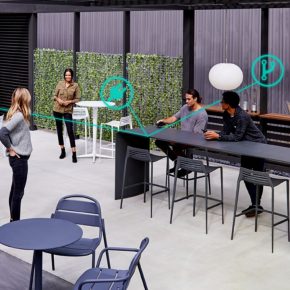
How sustainability and technology is shaping the urban environment and the street furniture within it
How are new sustainable policies going to shape the urban environment of the future and how will these influence street furniture design and application are questions asked by the Bailey Street Furniture Group in this article.
Approximately 72% of the EU population lives in urban areas [1]. Cities and towns across Europe are evolving and growing at an incredible rate.
This has meant a new and more developed model of sustainability is required. One which saves energy, protects the environment and increases citizens’ wellbeing.
Experts believe one of the biggest impacts on street furniture as part of such sustainability transformations, is the adoption of technology. This involves revolutionising street furniture away from a single purpose to a multi-purpose entity.
For example, a street bin will not only function as a bin but also as an audio reference point for partially sighted people, a WiFi hub spot and even has the functionality to let the operators know when it is reaching full capacity.
Sustainability in the urban environment
According to a UN report, almost 70% of the world’s population will live in urban areas by 2050 [2]. This will pose many different challenges for future towns and cities.
A radical transformation of the current model of urban development is required, where sustainability is set to influence towns and cities by adopting more people-orientated policies.
These include supporting community wellbeing through the improvement of infrastructure and land use, reducing greenhouse gas emissions to improve air quality, and finally to manage the planet’s resources responsibly.
The three policies stated above all involve the integration of street furniture into urban spaces. So how do designers, developers and manufactures work together to achieve such objectives?
The future of street furniture
Street furniture plays a crucial role in towns and cities, providing residents with a sense of wellbeing and fulfilment. Not only does it need to be functional and practical in carrying out a specific purpose, it should be aesthetically pleasing to match the aspirations of the urban space.
To support community wellbeing, city planners and landscape architects are ever evolving the role of digital technology within their street furniture designs.
By closely collaborating with street furniture manufacturers and designers, it means external furniture products of the future will enhance user experience by offering multiple functions.
For example, the rapid adoption of smart phones will result in users being able to interact with various street furniture structures. Users are also now able to charge their phones from benches or litter bins which act as WiFi hotspots.
Not only that, but digital technology integrated into urban furniture opens up the way for councils to gather user data to see how occupants engage with the urban environment.
Through the information that is collected (with GDPR laws enforced), such street furniture devices have the potential to improve the planning, design and management of future urban spaces.
Councils and city planners’ objectives to improve sustainability also involve improving air quality and reducing greenhouse gas emissions.
Cycling schemes are a popular addition to many towns and cities across the world, particularly as urban spaces are being designed more for pedestrians rather than motor vehicles.
Today’s pedestrian zones shape the nature of cities more than ever before, where motor vehicles have ever-limiting access to city centre spaces. European cities such as Copenhagen and Barcelona have a growing network of pedestrian streets.
In the case of Barcelona, superblocks, or superilles as they are natively known, have been introduced. These are sections of streets that essentially make up a block where through traffic is only permitted on perimeter roads. This has helped reduce vehicle occupancy in the public spaces from 85% to 25% today [3].
Such schemes create new networks of public spaces, which see pedestrians share with cyclists. Cycle usage has increased over the last 40 years – for example, London in 1977 saw around 27,000 people cycle across the central London cordon, compared to 162,000 in 2017. Indeed, there was an average of 745,000 cycling journeys per day in 2018, which is increasing year on year [4].
This increase in cycling usage has significantly influenced street furniture trends as it has seen an increased demand for cycle stands and cycle shelters.
The increase in bicycle use and decrease in motor vehicle use within urban spaces will not only improve air quality, but will also improve community wellbeing due to the increased levels of exercise.
Bailey Street Furniture Group – Inspiring urban spaces of the future
Bailey Street Furniture Group has a clear vision – to transform and inspire urban spaces of the future with stylish and functional street furniture. The street furniture group encompasses four key brands – Bailey Street Scene, Artform Urban Furniture, Street Furniture Direct and AMV Playgrounds.
The group’s unrivalled product range includes street furniture, shelters, canopies and walkways, bollards, and playground equipment.
Products can be supplied as stock options or alternatively as bespoke solutions, where it is manufactured in the UK by skilled engineers and installed by an in-house team.
The street furniture group collaborates with contractors, architects, landscape architects, and external works clients to continually enhance the role street furniture has within urban environments.
Bailey Street Furniture Group genuinely believes inspiring outdoor spaces and urban places are crucial for the health and wellbeing of society.
The street furniture group constantly strives to integrate better technology and a more sustainable solution in every piece of street furniture that is produced.
References
[1] Source European Commission (https://ec.europa.eu/info/index_en)
[2] Source United Nations (https://www.un.org/development/desa/en/news/population/2018-revision-of-world-urbanization-prospects.html)
[3] Source Smart City Lab (https://www.smartcitylab.com/blog/inclusive-sharing/cities-are-for-people-towards-a-new-conception-of-public-spaces/)
[4] Source Transport for London Report 2019 (http://content.tfl.gov.uk/travel-in-london-report-12.pdf)
Contact Info:
01625 322888
[email protected]
Bailey Street Furniture Group
Adlington Business Park
London Road
Adlington
Cheshire
SK10 4NL
Social profiles:
Visit Supplier's page
Latest news

18th December 2024
BMBI: October Merchant sales rally with a +7.3% month-on-month increase
The latest Builders Merchant Building Index (BMBI) report shows builders’ merchants’ value sales in October were up +1.2% compared to the same month last year.
Posted in Articles, Bathrooms & Toilets, Bricks & Blocks, Building Associations & Institutes, Building Industry News, Building Products & Structures, Building Services, Building Systems, Civil Engineering, Cladding, Concrete, Cement, Admixtures, Drainage, Drainage Services, Floors, Garden, Hand Tools, Hard Landscaping & Walkways, Health & Safety, Heating Systems, Controls and Management, Heating, Ventilation and Air Conditioning - HVAC, Information Technology, Interior Design & Construction, Interiors, Landscaping, news, Paints, Paints, Coatings & Finishes, Pipes, Pipes & Fittings, Plant, Equipment and Hire, Plumbing, Power Tools, Publications, Research & Materials Testing, Restoration & Refurbishment, Retrofit & Renovation, Site Preparation, Sustainability & Energy Efficiency, Timber Buildings and Timber Products, Walls, Waste Management & Recycling
18th December 2024
GEZE UK announce Kids' Village charity partnership
Kids’ Village is delighted to have partnered with GEZE UK as their 2025 charity of the year – find out more via the article…
Posted in Access Control & Door Entry Systems, Architectural Ironmongery, Articles, Building Industry Events, Building Industry News, Building Products & Structures, Building Services, Charity work, Doors, Facility Management & Building Services, Health & Safety, Restoration & Refurbishment, Retrofit & Renovation, Security and Fire Protection, Windows
18th December 2024
Encon Achieves 5% Club Silver Membership
The Encon Group, the leading independent distributor of building materials, is pleased to announce that it has been awarded Silver membership of The 5% Club by the 2024/25 Employer Audit Scheme.
Posted in Articles, Awards, Bricks & Blocks, Building Associations & Institutes, Building Industry Events, Building Industry News, Building Products & Structures, Building Regulations & Accreditations, Building Services, Building Systems, Civil Engineering, Cladding, Concrete, Cement, Admixtures, Facades, Hard Landscaping & Walkways, Health & Safety, Insulation, Landscaping, Plant, Equipment and Hire, Recruitment, Restoration & Refurbishment, Retrofit & Renovation, Site Preparation, Training, Walls
18th December 2024
SWA: A focus on Steel Window Association member West Leigh
Located in Charlton, South London, SWA member West Leigh was established during the Blitz, in 1943. During the destruction in London, the company helped in repairing windows and facades that had been damaged by bombings throughout the city.
Posted in Articles, Building Associations & Institutes, Building Industry News, Building Products & Structures, Building Services, Building Systems, Case Studies, Facades, Glass, Glazing, Restoration & Refurbishment, Retrofit & Renovation, Steel and Structural Frames, Walls, Windows
 Sign up:
Sign up: